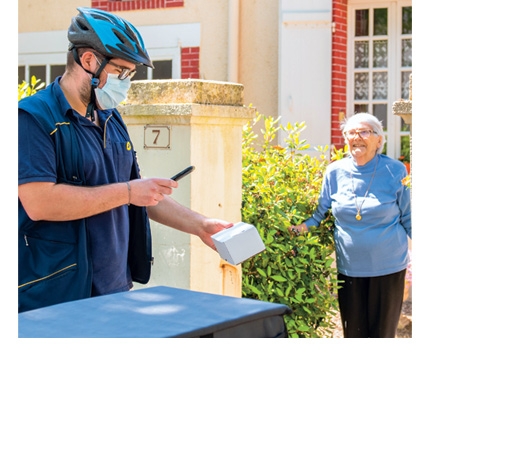New digital uses, based on trust
85%
of French people have an Internet connection
74%
of French people say they use the Internet daily
The widespread use of smartphones and tablets has increased the number of connection opportunities and the use of the Internet has become an essential tool in daily life as it is used to communicate, work, shop, travel, carry out administrative procedures, consult and manage bank accounts, pay bills and taxes.

The pervasiveness of the Internet has given rise to new challenges: data protection, transparency, mastery of digital tools, inclusion of seniors and vulnerable populations. As a leading public service operator and trusted third party, La Poste Groupe implements systems and technologies for a responsible digital environment accessible to all.
For ethical big data
Personal data is an essential component of the digital revolution. The economic model of many free services, such as search engines, is based on the exploitation and marketing of users' personal data.
La Poste refuses to be part of this process and is committed to strictly respecting the confidentiality of the data entrusted to it by its customers.
Learn more about the group's ethics and code of conduct
Since 2016, in anticipation of the GDPR (General Data Protection Regulation), the group has set up a Data Charter, the first data protection charter in France. It responds to the expectations of the French on the subject, respects the recommendations of the GDPR and guarantees customers of the group's digital services responsible use of their personal data.
For more than a century, the postman's oath has guaranteed that mail and money entrusted to La Poste will be respected. It has been extended to electronic personal data. The company's commitment is matched by the honourable commitment of its employees.
Digital access for all
To provide its customers with access to basic digital tools in complete confidence, La Poste has developed a set of free and fully secure platforms. It includes:
An @laposte.net mailbox, guaranteed for life, independent of access providers and whose contents are not commercialised;
The Digiposte application, a service that collects, sorts, automatically classifies and stores each user's administrative documents in complete security, allowing them to access them wherever they are;
La Poste's Digital Identity, the first electronic identity to be qualified to a substantial level by ANSSI, verified by the postman or in the post office, allowing access via FranceConnect to more than 700 online public services. This service confirms La Poste as a universal operator of digital exchanges.
As a driver of digital inclusion, La Poste is developing digital applications and services for seniors and people with disabilities. For example, Ardoiz, the first tablet designed for seniors, is ergonomic and easy to use, with no keyboard or mouse, and is delivered by the postman to the user's home.
At the same time, the group has carried out its internal digital transformation. The "All digital" training programme has been rolled out to all five business lines, eliminating disparities between postal workers and enabling everyone to understand the challenges of digital technology.
All postal workers must master the digital technologies that are useful for their jobs. Like postmen and postwomen, who are equipped with Factéo smartphones, a digital tool that facilitates their work on the road and makes it possible to offer new services tailored to the needs of every French person.
Any postal worker wishing to improve their digital expertise has the opportunity to train. They can even become a developer through the Simplon School and, at the end of a nine-month work-study programme, obtain technical expertise that provides real added value for the group.
The rise of the Internet is shaking up the traditional mail business and at the same time revealing tremendous opportunities for Le Groupe La Poste.

It sees this as a powerful lever for transforming its model and for social inclusion, giving everyone access to this resource, with every guarantee of trust.
Environmentally-friendly digital technology
With nearly 818,000 pieces of equipment including telephone computers, tablets, photocopiers, etc., the group has already taken concrete initiatives :
Since 2015, the carbon footprint of La Poste's and La Banque Postale's IT equipment has been measured. Updated in 2020, it has been accompanied by a change in method with the inclusion of stock
improving the management of waste electrical and electronic equipment by extending the useful life of IT equipment through a repair policy that encourages re-use
supplying 100% of its sites with electricity from renewable sources, through the system of guarantees of origin for the buildings managed by La Poste Immo
specifications for the purchase of its IT equipment, enabling the carbon footprint of IT equipment to be compared before any purchase and the integration of EcoLabel requirements.
an awareness-raising approach for the responsible design of digital services, covering the entire life cycle;
the inclusion of responsible digital design in training courses with the possibility of certification
the implementation of an energy management system aimed at reducing energy consumption and raising user awareness of digital eco-actions.
Digital technology is having a growing impact on the planet and is also an essential tool for the ecological transition.
Faced with these facts, Le Groupe La Poste, a founding member of the Institut du Numérique Responsable, is implementing a structured approach to reduce the environmental footprint of its information and communication systems.
As a founding member of the Institut du Numérique Responsable, the group's approach is in line with the best standards.
This approach is steered internally by the Responsible Digital Committee in which the group's social commitment, information systems and purchasing departments participate.

The environmental issues covered by the Responsible Digital Committee include measuring the footprint of the Group's IT assets and the measures taken to reduce it, particularly through the purchasing policy, the responsible design of digital services, and the reuse and management of electronic waste.
Assessing the environmental footprint of IT equipment
Every two years, Greenargile (a dedicated in-house tool) is used to measure the environmental footprint of the IT equipment used by users (computers, screens, printers, etc.), the IT network infrastructure and the data centres.
A major IT inventory was carried out in 2015 and 2018, and updated in 2020. This inventory serves as a basis for calculating the carbon footprint of equipment within the scope of La Poste SA and La Banque Postale for scopes 1, 2 and 3.
The Greenargile solution evaluates the GHG emissions of the IT equipment by taking into account the three phases of the life cycle (production, use, end of life). The energy consumption of digital equipment in 2020 has been estimated at 376 GWh. The volume of associated GHG emissions is relatively low (44,559 tonnes), as the electricity used to power the buildings and equipment is 100% renewable.
Work is ongoing to complete this "internal" footprint measurement with emissions and consumption related to outsourced data centre services. The objective of scope 3 (concerning services such as dry and data hosting, facilities management and management in cloudSAAS mode) is to establish a methodology for measuring the volume of GHG emissions over the 2020 period in the digital domain in order to prepare for the integration of these emissions into the measurement of the Group's emissions from 2021.
In addition, La Poste contributes annually to an external benchmark(2), GreenIT.fr, in order to measure the footprint of its fleet and its maturity in the field of responsible digital technology, bringing together several large French companies (Airbus, Pôle emploi, Decathlon, etc.).
Assessing the environmental footprint of IT equipment
In order to reduce the environmental footprint, the group is developing responsible purchasing criteria. A state of the art CSR criteria repository is gradually being put in place over the course of consultations and will eventually cover all IT purchases beyond equipment (software, intellectual services, hosting, etc.). These criteria may concern the energy performance of equipment or other criteria. In 2020, at group level, the purchasing department launched two consultations including a criterion relating to energy performance, in line with the requirements of the ISO 50001 standard. These consultations covered workstations and printing solutions.
With regard to the "datacentre" aspect, an initial process was initiated at the end of 2019 with a view to evaluating the performance and impacts of a datacentre (regardless of the type of offer proposed by the data centre: dry hosting and with data, outsourcing, management in cloud/SAAS mode). In addition to the two consultations mentioned above, a total of ten or so consultations launched in 2020 (all HA IT fields combined) will include Digital Responsibility/CSR criteria.

The group is also working on the eco-design of products and services and is carrying out life cycle analyses on certain offers.
Finally, in order to meet its obligations in terms of digital accessibility (customers and postal workers), the group is setting up a team of testers in 2021 specifically composed of employees with disabilities during the purchasing phase of products and services.
Implementing the energy management system (EMS)
The EMS aims to raise awareness among building occupants and users of IT customer workstations. Thus, the use of new collaborative and file-sharing tools, the optimisation of digital exchanges, and the putting of devices on standby are practices shared with users.
Managing electronic waste
Experiments have been carried out, in particular with a social economy organisation, to study internal and external reuse. They will make it possible to identify the risks and guarantees to be taken in the reuse of electrical and electronic equipment.
